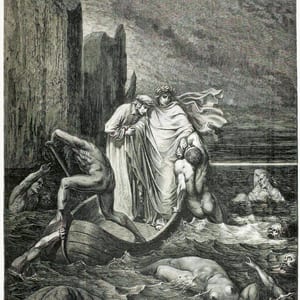To Hell and back over lunch: an introduction to Dante
By Lara J Carim, on 16 May 2013

The Vision of Hell viii, iII. Gustave Doré
(UCL Library Special Collections)
Severed heads, rivers of blood and pools of faeces might not seem the most appealing topics over lunchtime, but there was standing room only at Professor John Took’s talk at the UCL Festival of the Arts on 14 May about Dante’s Divine Comedy – one of the most horrifying, yet uplifting, poems ever written in western literature.
In the words of Professor Took (UCL Italian), Dante’s Commedia (Comedy) – which charts one lost soul’s metaphorical journey to Hell, Purgatory, Heaven and back in several thousand lines of rhyming poetry – is “a work of tremendous stature, which lays hold of you by the throat and won’t let you go”.
A note for the pedants: the Divina (Divine) prefix, by which the poem is better known, was added by the Church during the Counter-Reformation in an attempt to co-opt the work – which already tells you something about the poet’s representation of the Papacy.
The stature of the poem is partly due to the linguistic influence it exerted; Dante was committed to writing in the language that the majority of his fellow Tuscans would understand, and his decision to write in the young Italian vernacular rather than Latin enabled him to shape the language profoundly, leading to his moniker as the Father of the Italian language.
Dante Alighieri was born in Florence nearly 800 years ago, but his work deals with universal, timeless themes. His unrequited passion for Beatrice (“more or less the girl next door” who remained his muse throughout his life); an intolerance of political and religious hypocrisy; and the loneliness and resentment at being forced to live on charity that resulted from his 20-year exile from Florence proved a heady brew for his attempt to make sense of life, humanity and our place in it.
As Professor Took said, Dante could really spin a yarn. He suffered what we would today call a mid-life crisis, finding himself in the middle of his life “in a dark wood, from where the right way out was obscure”.
The Roman poet Virgil appears as a shadowy figure, and in another forerunner to 21st century psychology, tells Dante that there is no quick fix: “You must come on a round-about journey where you will see every kind of depravity”.
The two then descend into the pit of Hell, which is shaped like an inverted cone and located beneath Jerusalem (the belief that the earth was at the centre of the universe held sway for well over another 400 years). From there, they tour the circles of Hell, reflecting with the damned souls on their crimes, which worsen as the pit deepens.
In Dante’s view there are three main categories of sin: intemperance – those we commit opportunistically – “No one wakes up vowing to pig out that day”, explained Professor Took to the audience, which was enthusiastically tucking into lunch; violence (against oneself and against God) and, worst of all, fraudulence.
Politicians, popes, thieves and many other named figures in history here are boiled in tar, have their heads twisted to face their backs and suffer many other excruciating punishments.
Memorably, at the very pit of Hell lie history’s great traitors. Brutus and Cassius (traitors of the Roman empire) and Judas Iscariot (traitor to God himself in the form of Christ) are forever wailing as they are chewed by a three-mouthed Satan.
Despite these images, the worst aspect of Hell is the state of spiritual destitution; in line with Christian doctrine, Dante underscores that it is love’s power to transform and enlighten us that enables the lost souls to start on the long, steep climb up the mountain of Purgatory. Having breached the peak of Purgatory, Dante experiences the possibility of reordering his life, and, ecstatic, finds himself at the gateway to Paradise.
Left at this cliffhanger, the audience burst into spontaneous applause and, more than one person headed off directly to a nearby bookshop to start immediately on the entire work – impact indeed for both Dante and Professor Took.
Lara Carim is Head of UCL Digital Communications and a languages graduate
 Close
Close

